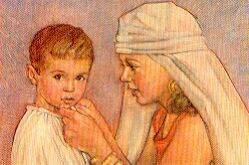The story of Hannah, in the first book of Samuel, always tears my heart a little when I hear it. Hannah is childless, is almost past hoping for a child. Yet she persists in praying for a baby. Her prayer is answered, and she becomes pregnant. She promises to repay God for the favor. The price of having the baby, though, is handing the child over to the service of God. She has the baby only to lose the baby.
The idea of having to pay God back for a prayer granted has always bothered me: how can we ever sufficiently pay back grace freely given? Even more personally distressing than that, though, is the scene where Hannah brings her weaned son, Samuel, back to the temple where she prayed for his conception, and leaves him there. “For this child I prayed,” says Hannah, “and the Lord has granted me the petition that I made to him. Therefore I have lent him to the Lord; as long as he lives, he is given to the Lord.” (1 Samuel 1:27-8) Jewish children at the time were nursed for the first two years of life, so I try to imagine carting one of my two-year-olds to church and leaving her there, for someone else to love and teach and raise. I know the honor of giving one’s child to the service of God is supposed to be enough for a mother, but I don’t know that I could bear the pain of separation that accompanied the honor.
And yet, the time always comes when we do give our children to God. Raising a child to adulthood is a series of surrenders, because trusting that your parenting has gone well is the only way to allow your child to mature to young adulthood. The first day of school, the first time alone at home, the first signs of physical maturity, the driver’s license, the series of graduations, are all times of handing over our children to God. We cannot always be the guiding force in our child’s life, much as we want to be. We have to allow other teachers, other influences, other experiences, to take hold. We have to trust God, and let go.
Hannah’s letting go foreshadows Mary’s letting go of Jesus, even as her beloved son was led to his early, dreadful death. Letting go is against our will. We are never really ready. It always comes faster than we expect. But our letting go is God’s will. We have to uncurl our fingers consciously. Like Mary, all too soon after we give birth, we have to extend our empty arms, and wish our loved ones well, and send them on their holy way.








